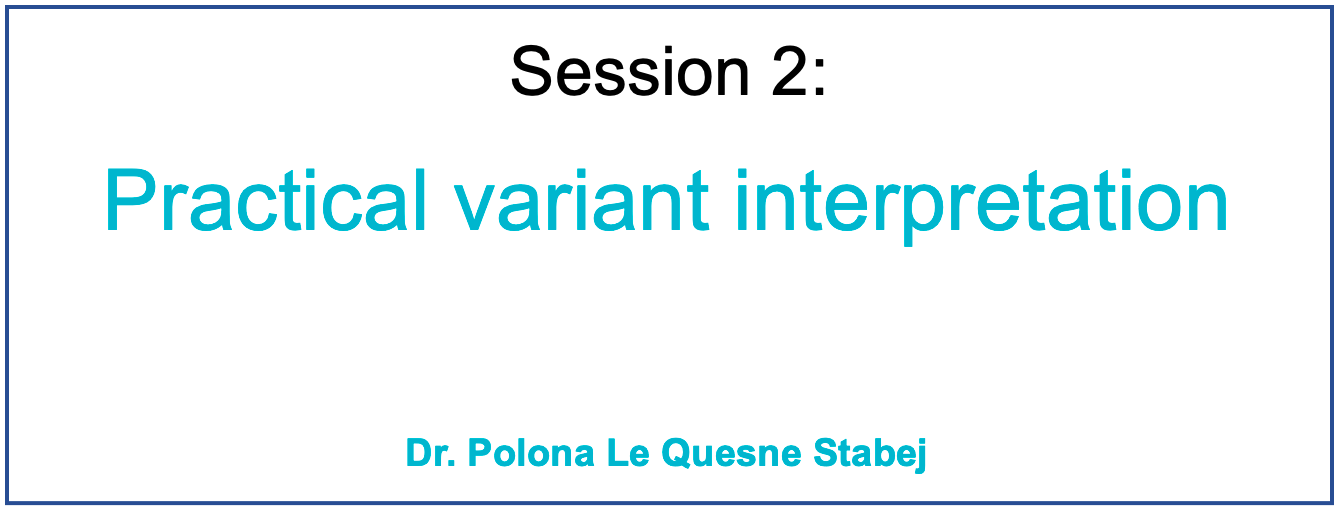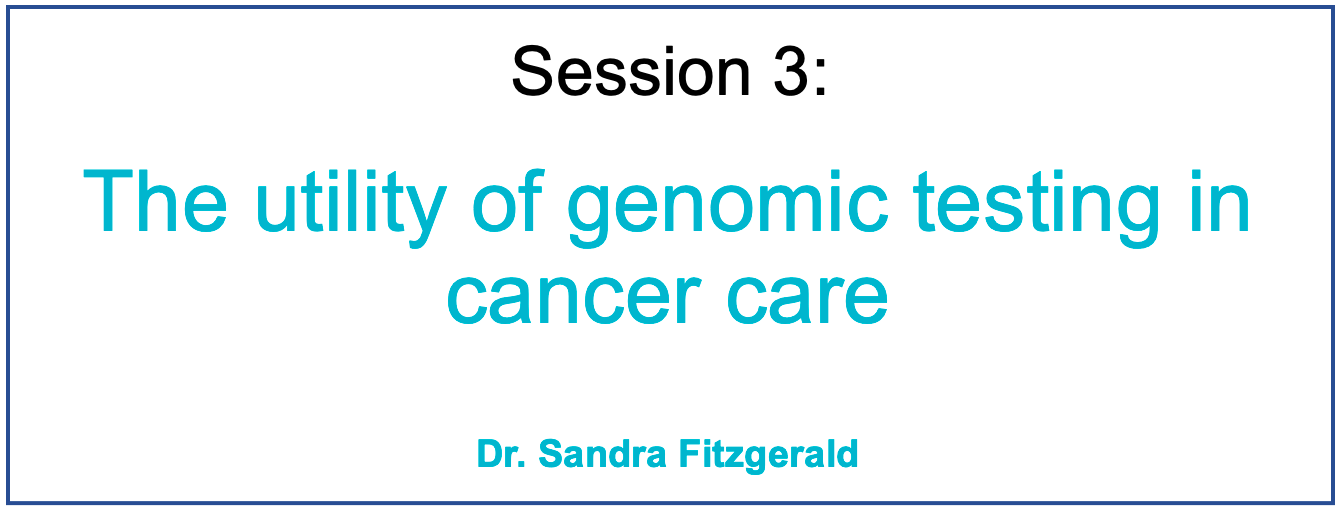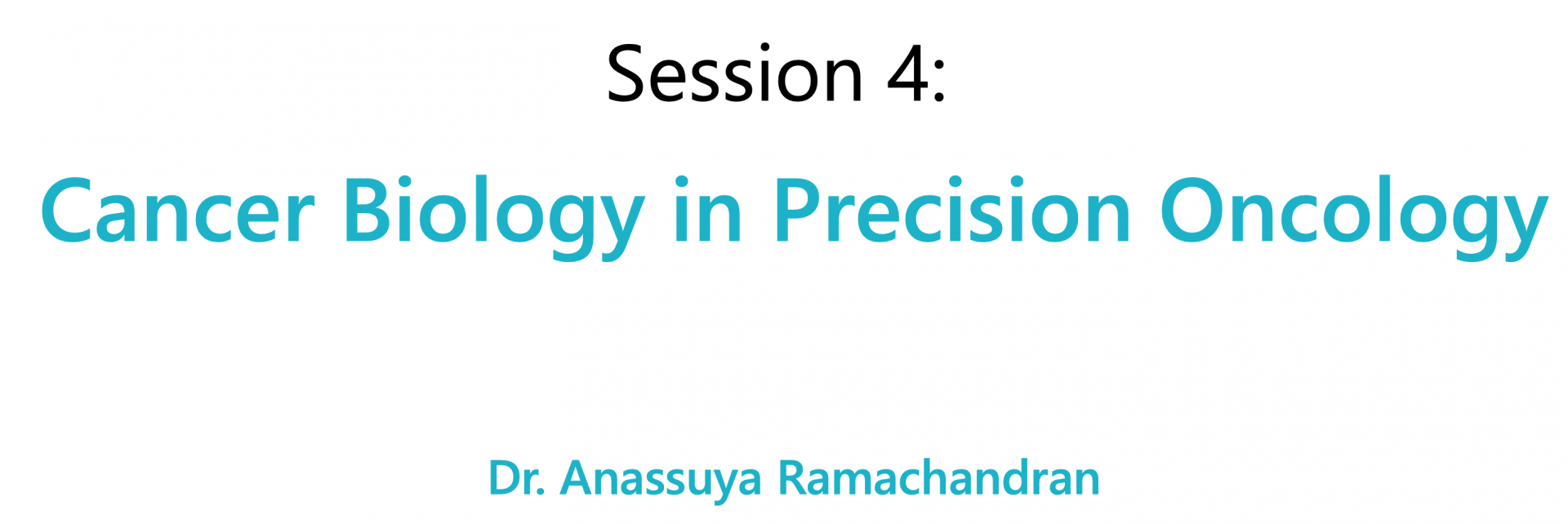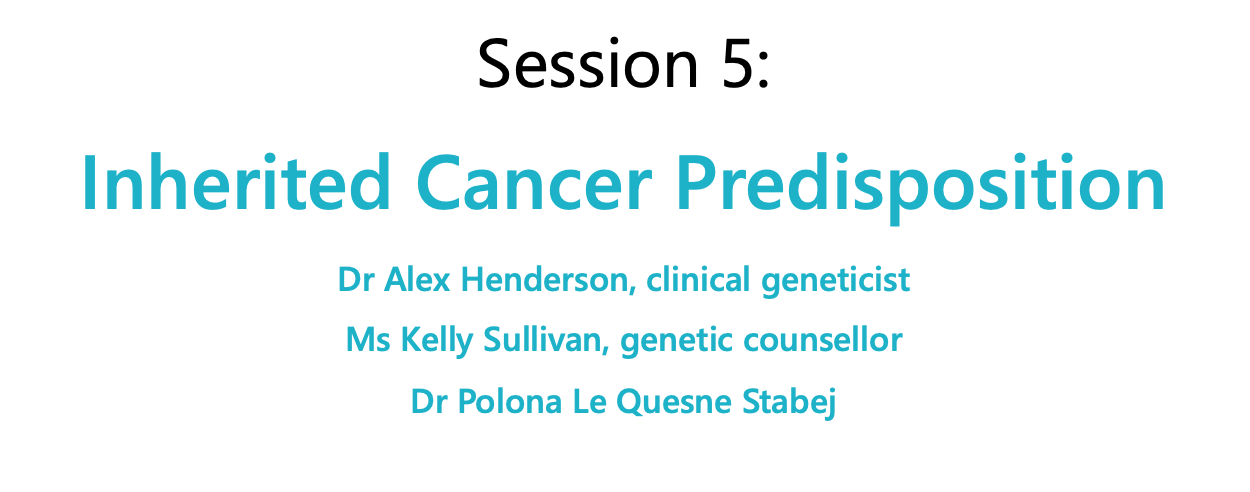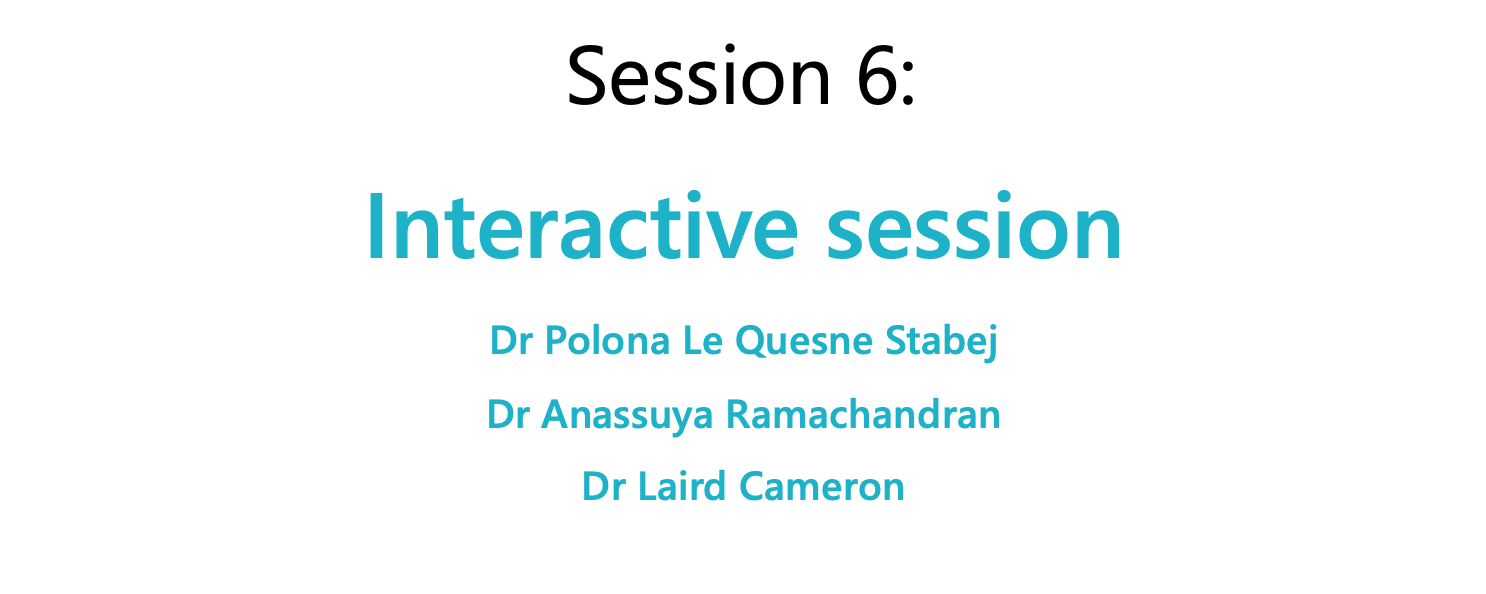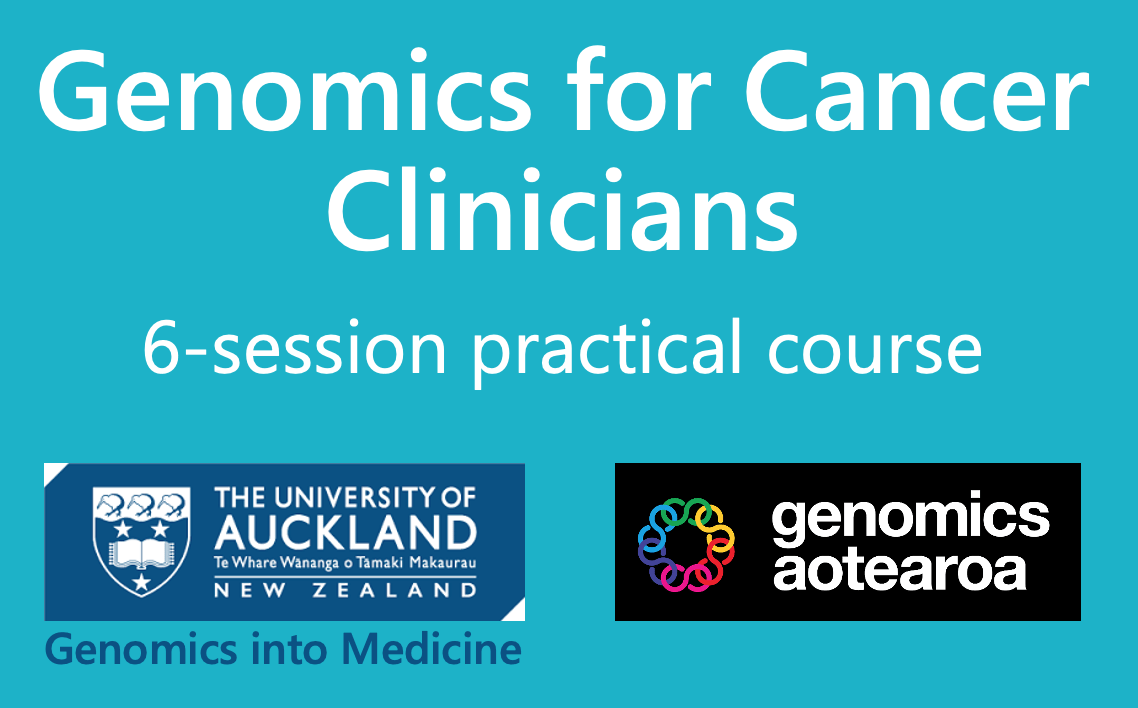
Genomics for Cancer Clinicians: 6-session practical course
27th May – 9th September, 2022
Genomics knowledge is changing the diagnosis and treatment of cancer. This cancer genomics course is an ideal introduction, or refresher, for oncologists, oncology trainees, cancer clinical nurse specialists or nurse practitioners. No prior knowledge of genomics is required.
Interactive case-based sessions cover the basics of cancer genomics, including essential cancer genomics and biology, and core concepts and terminology used in next generation sequencing reports (eg Variant Allele Frequency, Read Depth, Tumour Mutational Burden). Participants will develop the skills needed to interpret Next Generation Sequencing (NGS) reports and understand the clinical implications of germline and somatic variants, including treatment and germline genomic testing recommendations
The course has been developed by Dr Polona Le Quesne Stabej and other members of Prof. Cris Print’s and Dr. Ben Lawrence’s research group (FMHS, University of Auckland), in collaboration with Auckland Hospital oncologists. The course is supported by The University of Auckland Genomics Into Medicine Initiative and Genomics Aotearoa’s Genomics Oncology fund.
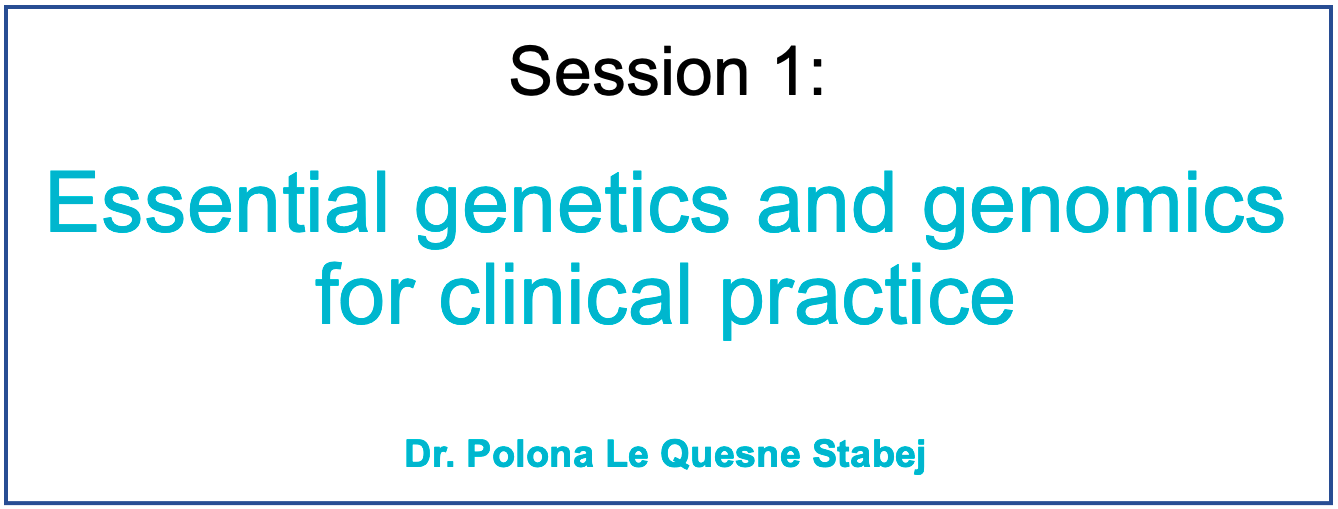
Session 1: This first session provides a refresher on genomics and genetics in the clinic. Essential aspects of genomics are covered first, including the distinction between germline and somatic variants (mutations). The primary structural features of the genome and gene are then considered, introducing the organisation of the gene into protein coding and noncoding regions, and the presence of exons, introns and 5′ and 3′ untranslated regions. Gene transcription, RNA splicing and protein translation are also discussed.
Following this introduction, common types of molecular alteration to the genome are described, including aneuploidy, structural rearrangements, copy number variants (CNVs) and small variants. The concepts of oncogenes and tumour suppressor genes are touched on, then the session delves into variant nomenclature standards in the context of an anonymised demonstration case report. A video recording of session 1 can be found here.
Session 2: This session, delivered by Dr. Polona Le Quesne Stabej, begins with a recap of the fundamentals presented in Session 1. This provides the foundation for a deeper dive into the process of genomic variant annotation and interpretation. The session introduces cancer clinicians to the databases used during the variant annotation process and the standards used for the classification of variant oncogenicity. The standard operating procedure for somatic variant classification in cancer, formulated by Horak et al. (2022) and Li et al. (2017) is presented. Several key databases, including GnomAD, ClinVar, ONKOkb, Cancer Hotspot, cBioPortal, CIViC, COSMIC and ClinGen are discussed with reference to the evaluation of evidence required to assess the clinical significance of a given variant. Session 2 ends with an interactive example of variant interpretation based on the case first presented in Session 1. A video recording of Session 2 can be found here.
Session 3: This session, delivered by Dr. Sandra Fitzgerald, discusses the pros and cons of genomic tests conducted on biopsy tissue and blood plasma. Tests of differing comprehensiveness available to NZ clinicians are first compared, including Biocartis Idylla and Agena Biosicence MassArray OncoFocus panels, which assess a few select genes for a large number of variants, the AmpliSeq for Illumina Focus Panel, which provides targeted sequencing of 52 genes relevant to solid tumours, and larger-scale panels such as FoundationOne CDx/Liquid CDx and the TSO-500 panel being developed locally. The talk then turns to the significance of read-depth and variant allele frequency (VAF) in relation to liquid biopsy of circulating tumour DNA (ctDNA) and also highlights processes complicating the interpretation of VAFs, including aging-related CHIP (Clonal Hematopoiesis of Indeterminate Potential). Discussion at the end of the presentation considers how clinical decisions can be informed by tumour mutational burden (TMB) and microsatellite instability (MSI). A recent report by Tie et al., (2022) is also mentioned, in which ctDNA data was used to guide treatment of stage II colon cancer, allowing a reduction in adjuvant chemotherapy use without impacting recurrence-free survival. A video recording of Session 3 can be found here.
Session 4: Dr. Anassuya Ramachandran frames the previously introduced case study in the context of the Hallmarks of Cancer. Ana then gives an overview on key concepts of the Hallmarks of Cancer including proto-oncogenes and tumour suppressor genes and oncogenic perturbations to receptor tyrosine kinase signalling and how this pathway can be targeted by therapeutic interventions. The session then addresses other key hallmarks of cancer and touches on the concepts of microsatellite instability (MSI) and tumour mutational burden (TMB) and how they are relate to neoantigen load and immunotherapy. She then discusses clonal heterogeneity and tumour evolution and finally discusses the hallmarks of cancer as they apply to the case study. A video of Session 4 can be found here.
Session 5: This session on Inherited Cancer Predisposition was delivered by Dr Alex Henderson, (National Clinical Leader, Te Aho o Te Kahu/Cancer Control Agency, Cancer Genetics; Capital & Coast DHB), Kelly Sullivan (Auckland DHB Genetic Counsellor) and Dr Polona Le Quesne Stabej (University of Auckland). The classification and interpretation of germline versus somatic variants is discussed, referencing the ACMG guidelines proposed by Richards et al., (2015). Two hypothetical cases of familial predisposition to cancer are used to illustrate the databases and forms of evidence that inform clinical genetic counselling and treatment. Useful guidelines on criteria for germline follow-up testing in the context of clinical oncology are provided by EVIQ and by Mandelkar et al., (2019). More information about national clinical genetic testing services in Aotearoa New Zealand can be accessed here. A video of Session 5 can be found here.
Session 6: Drs Polona Le Quesne Stabej, Anassuya Ramachandran and Laird Cameron present the final session of the 2022 Genomics For Cancer Clinicians course, in which they describe and analyse genomic test results that shaped the therapeutic journey of a patient with stage 4 lung cancer. As discussed by Laird, NGS-based information included the identification of an EGFR p.L858R variant which prompted treatment with Erlotinib. The response to treatment was less robust than hoped for, resulting in stable disease but eventual progression. Polona interactively recaps learnings from earlier sessions on variant curation, examining the NGS findings with reference to GnomAD, Cancer Hotspot, COSMIC and ClinVar databases (see this file containing databases to query and input terms), then addresses the actionability of the EGFR p.L858R variant by querying the CiViC and ONCOKb databases. Ana highlights hallmarks of cancer pertinent to this case, as well as the protein structural basis of the p.L858R change which results in constitutive EGFR activity (and the sensitivity to Erlotinib of cells carrying this variant). Ana then turns to the problem of treatment-driven Darwinian selection of tumour drug resistance which, in the case of this patient, was first acquired by c-MET amplification. This was addressed with the Type I MET inhibitor, Crizotinib – a treatment which ultimately resulted in the emergence of a resistant MET p.Y1230H mutation. A video of Session 6 can be found here.
In 2018, Genomics Into Medicine members delivered a plenary session and a genomics workshop in each of the General Practice Continuing Medical Education (GPCME) events in Rotorua (June) and Christchurch (August).
If you attended either of these meetings, your registration will allow you to download material from these sessions/workshops here (LINK).
In March 2019, Genomics Into Medicine contributed to a genomics plenary session followed by a 5-speaker workshop/discussion in the Goodfellow Symposium for general practitioners.
If you attended this symposium, your registration will allow you to download material here (LINK).
The following links may be of use of medical professionals involved in clinical genomics:
• https://decipher.sanger.ac.uk/browser
• UK Genomics Education Programme: https://www.genomicseducation.hee.nhs.uk/education/
• RCGP short webinars: https://www.rcgp.org.uk/clinical-and-research/our-programmes/genomics-webinars.aspx
• Genetic Testing Registry : https://www.ncbi.nlm.nih.gov/gtr/
• Twitter Genomics Education: https://twitter.com/genomicsedu
• Simplified standards to use when discussing gene variants: http://varnomen.hgvs.org/bg-material/simple/
• Locus Reference Genomic (find the right gene or transcript identifier or make conversions): https://www.lrg-sequence.org
• ClinVar (the go-to database of genetic variants): https://www.ncbi.nlm.nih.gov/clinvar/
• LOVD (Leiden Open-source Variation Database): http://www.lovd.nl/3.0/home
• Genomizer (A quick variant search tool – an initial one stop shop): http://genomizer.com
• Mutalyzer (Excellent conversion and checking tool): https://mutalyzer.nl
• Decipher (examine a variant in the context of clinical data): https://decipher.sanger.ac.uk/about#overview
• Align-GVGD (predict effects of missense substitutions by extending the original Grantham score methods): http://agvgd.hci.utah.edu/index.php
• Cancer Genome Interpreter (excellent online tool to interpret cancer genomic changes): https://www.cancergenomeinterpreter.org/home
• wANNOVAR (excellent online tool to interpret constitutional genomic changes): http://wannovar.wglab.org
• OncoKB (Frequently updated searchable database of cancer gene variant treatment implications): http://oncokb.org
